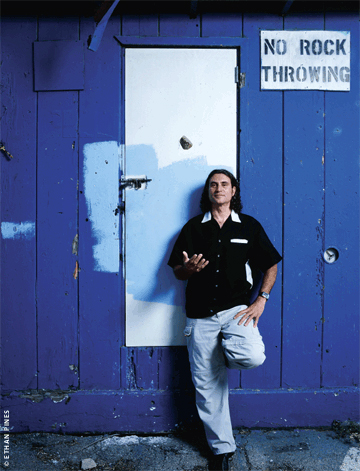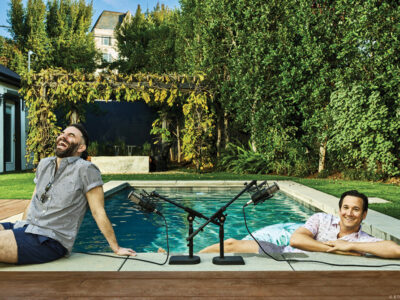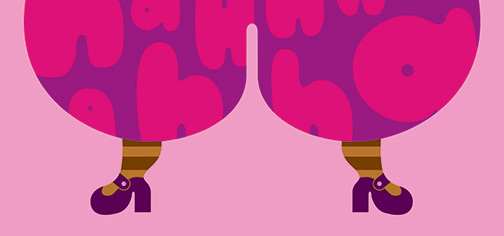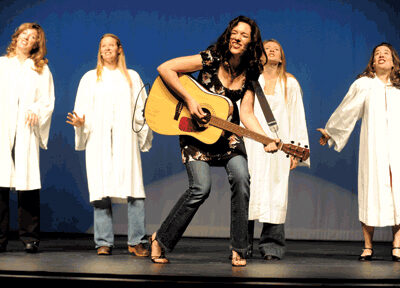
Director/Producer Paul Provenza finds out how far he can take a joke in The Aristocrats.
By Caren Lissner | Photography by Ethan Pines
“There is a real value in transgressive humor,” Paul Provenza C’79 is saying. “One of the fascinating things is watching it with an audience. Lines are crossed in different places with different people. People have ideas about what you should and shouldn’t say. Sometimes it’s coming from a place of fear, and that’s why things need to be dealt with comedically.”
OK then: How would you tell a version of the world’s dirtiest joke in a magazine read by 150,000 Ivy League alumni?
“It would involve Ben Franklin, a lot of illegitimate children, and syphilis,” says Provenza.
Uh oh.
“I did a joke like that at Alumni Day once, and it went over great,” insists the Mask & Wig alumnus and documentary director, who’s speaking from his home in Venice, California. “Every time you say something you’re not supposed to say, people love it. Whenever a corporation hires you to do a corporate dinner, they give a list of things not to talk about, like that the president of the company had a lawnmower accident. That’s the first thing you talk about. People want to hear about that.”
Earlier this year, Provenza produced The Aristocrats with comic/magician Penn Jillette, filming approximately 100 comedians describing the same classic sick joke. The joke in question, which comedians say goes back to Vaudeville days, starts off pretty much like this: “A man walks into a talent agent’s office. He tells the agent that he has a great family act. The talent agent says, ‘I already have enough family acts.’ The man says, ‘But ours is different.’”
Depending on who’s telling the joke, the man’s explanation includes incest, excrement, vomit, gunfire, and occasionally farm animals. When the talent agent asks what the act is called, the man replies, “The Aristocrats.”
Didn’t leave you howling on the floor? That only proves that the joke’s success depends on who’s telling it.
Provenza has long considered himself a “free-speech nut.” In fact, it was his interest in verbal liberties that prompted him to enroll at Penn with an eye toward law school. But the comedic impulse was even stronger.
“Ever since I was about eight years old, I used to watch The Ed Sullivan Show with my grandmother, who was from Italy,” the 48-year-old Provenza says. “After family dinners, we’d sit around and watch. I got hooked in very early. I loved Pat Cooper; he’s in the movie. Larry Storch, Phyllis Diller.”
He performed standup while a student at the Bronx High School of Science, taking the subway to the Improv Comedy Club in Manhattan, where late one night he performed in front of an emcee named Jay Leno.
When it came time for college, Provenza chose Penn (where he expected to major in philosophy with a minor in biology) rather than a school with an established theater-arts program.
“At the time, Penn was just developing a theater-arts program,” he recalls. “I asked what would be necessary to actually wind up with a degree. They told me, and I was able to take a leave of absence and study at the Royal Academy [of Dramatic Art] in London.
“I filled in all the gaps,” he adds. “After endless conversation, it was clear that I was serious. I created my own major. It seemed easier to fight the bureaucracy of Penn than go to a different school. I made tremendous friends and loved writing and performing with Mask & Wig, developing a community of people who were funny and smart and interesting. I wanted to figure out how to make it work.” He became the Wiggers’ artistic director.
“Mask & Wig was pretty special in my life,” he acknowledges. “Great scripts, really funny, interesting people—and of course, you get to dress in women’s clothes. My Mask & Wig buddies and I still are in touch to this day. A huge bunch of them came to The Aristocrats in New York.”
Provenza cobbled together a cadre of clever comrades from Mask & Wig, Quadramics, and the Penn Players.
“I started arranging little shows around Penn,” says Provenza, who lived in the Quad dorm Speakman freshman year. “I’d go to Hill House and say, ‘This lounge is empty on Friday night. Can we do a show here?’ We’d do shows—Ron Darian [C’77 EAS’77], Bob Myer [C’73], and Bob Young [C’74], who went on to write [for television], Bill Grundfest [C’76] who went on to write Mad About You, and a guy named Sam Domsky [C’78 D’82], who is now a dentist in the Philadelphia area.”
The dentist actually provided one of the more significant links to comedy.
“At the time, he was on a comedy team with his friend at Temple Film School, who was Bob Saget,” Provenza recalls. “He came, and we did shows at Hill, and we did shows at Houston Hall.”
Bob Saget, who speaks some of the dirtiest lines in The Aristocrats, recently commented in USA Today: “Sam and his friends went to Penn—I was too dumb to go there and Temple did have a great film program … Sam and I did comedy in the dorms’ coffee houses, Pagano’s Pizza, and he is part of a group called ‘Mixed Nuts.’ They are truly hilarious and all could have gone into show business but chose to have normal lives and raise families.” (Asked if he had any good dirt on Saget, Provenza responds: “Say hello to him, and you’ll hear a lot of dirt on Bob Saget. He’s always been hilariously filthy.”)
Provenza and his gang performed off-campus in various venues, including Pagano’s and a now-defunct South Street club called Grendel’s Lair. And as his comedy career surged, the prospect of law school faded.
“Halfway through, I realized that comedy was where my heart was,” he says. “I had friends at Brown and Princeton and so many universities who were doing the same things I was doing, but they were getting credit for it and I wasn’t.”
A few months after graduating with Penn’s first-ever theater-arts degree, Provenza landed a role in an ABC sitcom pilot. He says he had a leg up on the competition from having spent all those college weekends and holidays driving from Philadelphia to New York to perform; all he’ll say about the pilot is that it concerned a rock group—and that it failed to get picked up.
He went on to land roles in various TV series, including Empty Nest, in which he played Patrick Arcola, the boyfriend of Dinah Manoff’s character (1992-93); Northern Exposure, in which he starred as Dr. Phillip Capra from 1994 to 1995; The West Wing, where he played an aide to a senator for a couple of episodes; and The Facts of Life, in which for five episodes he played Casey Clark, who dated the Blair Warner character.
He also continued hosting and creating comedy shows, both on TV and off.
It was his interest in the ingredients of this art that made him partner with Penn Jillette. About four years ago, the two comedians were talking about jazz and improvisation.
“Penn was getting into jazz; he plays upright bass,” says Provenza. “We talk deeply and pretentiously about every subject. He talked about the arcane aspects of improvisation, when does technique help you to improvise, and when does it get in the way of your ability to be free.”
It’s different in comedy, he told Jillette, because rather than interpreting the same joke, comedians try to stay away from what others are doing. “But if you see comedy as an art form, it’s about the singer, not the song,” Provenza explains. “That’s the real thesis of the movie. What if we went to our friends and had them all do different versions of the same joke? Then we thought, ‘What would the joke be?’ It was clear it would be ‘The Aristocrats.’”
Provenza filmed comedians ranging from Phyllis Diller to Andy Dick putting their special spin on the ironic tale. (There are some other Penn notables in it, too, including comic Wayne Cotter EAS’77 and comedy writer Alan Kirschenbaum W’85, whose father, Freddy Roman, is a comic Provenza watched on TV growing up.) Some of the comedians reverse the joke; some employ foreign accents; and some just pontificate.
The film has earned some rave reviews. The New Yorker’s David Denby said it “exudes cheerfulness and expansive joy” (and even worked the word coprophagy into his review).
While Provenza set out to show different comedy styles, it is the controversial nature of what’s said that seems to have generated the most discussion. At one point, for example, Eric Cartman, one of the animated characters from South Park, tells the joke to his three friends and adds: “Then the father gets up and says, ‘And now for our impersonation of the victims of 9/11.’”
Unsurprisingly, Provenza does not believe there should be arbitrary limits on language. “I believe in complete and total freedom,” he says. “Personally, I have many boundaries, most of which I’m proud of. People have the right to be offended, but what offends people [varies]. There was an interesting incident during an interview [with Bob Saget] in which a journalist had an emotional response to the talk of incest. There was clearly something in her past that made that visceral, and that’s a perfectly reasonable response from her. But not from everybody else. The fact is, nothing that anybody talks about is out of thin air. It’s all reality. It doesn’t take a twisted, sick imagination to talk about incest or pedophilia or racism or what have you. In the movie and in the joke, the irony is established early on. The whole point is that anything people say is supposed to be offensive, rude, or vile. If they say it, clearly it’s because they think it’s offensive and vile.”
But Provenza, who is single, understands that The Aristocrats is not a film for kids. His production team tried to make sure that people were aware that it is not Disney’s The Aristocats.
“Here’s the really funny part,” he said. “We had a screening in Florida, and a family came. It was about 40 minutes before they left. That’s faith in Disney, you know that?”
Caren Lissner C’93 published her first novel, Carrie Pilby, in 2003.




